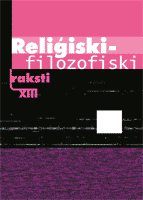Arī laikmetā bez Dieva viss ir Dieva pilns. Bernhards Velte (1906-1983) un Dieva filozofiskie meklējumi 20. gadsimtā
Even in a Godless Era God is Everywhere. Bernhard Welte (1906-1983) and Philosophical Search for God in the 20th Century
Author(s): Zbigņevs StankevičsSubject(s): Philosophy
Published by: Latvijas Universitātes Filozofijas un socioloģijas institūts
Summary/Abstract: The aim of the paper is to acquaint the reader with Bernhard Welte – one of the most characteristic personalities within the Christian philosophical thought of mid- 20th century. As a religious philosopher and theologian he devoted his life to the investigation of religious experience, its crisis and ways of attesting this experience anew in the 20th century. Welte sought to build a bridge between a godless culture and philosophical thinking open to God. The paper opens with the description of Welte’s life and activities and goes on looking for the roots that gave rise to offshoots of new thinking in describing the environment that formed his personality and naming the celebrities in the sphere of theology and philosophy who were the source of his inspiration. In characterizing what was specific in the heritage of the Christian thinker the stress is laid on how fearlessly he discarded the traditional way of thinking and came to a completely new statement of the problem. Thinking along with Welte is thinking about something for the first time. While viewing a thing one must get rid of the attitude that requires dealing with the object in conformity with what we expect of it. Welte started using phenomenological analysis in the sphere of religious philosophy discovering in the process that «every great philosophical system, however distant from Christianity it might seem, reflects eternal light», and coming to the conclusion that «the eternal and never seen Face can be encountered everywhere from which ever side you start looking for it». The final part is devoted to the analysis of Welte’s work The Zero Light in which Welte sets off against the urge of the contemporary society to achieve absolute power over the world (leading to loss of orientation in questions of sense and disintegration of personality) a borderline and the ‘zero’ experience that can be interpreted as a possibility of a new religious experience. In every one of his works Welte sought to look for the traces of the Eternal in all the realities of the surrounding world, in society and in the human being and he tried to express the Christian message in a way contemporary man can understand calling on theologians to revise the language of theology making it more understandable to contemporary man.
Journal: Religiski-filozofiski raksti
- Issue Year: XIII/2010
- Issue No: 1
- Page Range: 61-76
- Page Count: 16
- Language: Latvian

